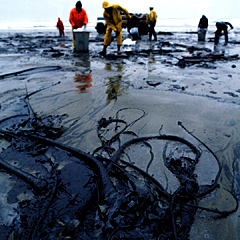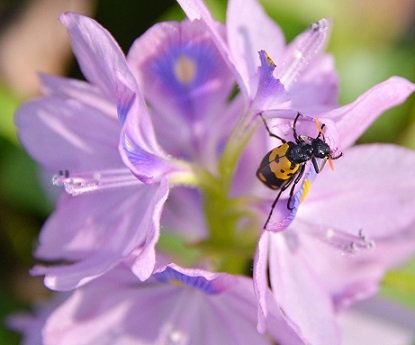Environment
The term environment is a broad term with many different definitions, and the term is used differently by different people. Thus it makes it difficult to define exactly what the environment is. Generally, in the context of public discussions around energy, especially the negative consequences of energy, the term environment is defined (4th definition) by the English Dictionary:
- "The natural world or physical surroundings in general, either as a whole or within a particular geographical area, esp. as affected by human activity."[2]
When discussing environment in a physics or chemistry context (and sometimes in engineering, but the above definition applies in some engineering situations), the more relevant definition from the Oxford English Dictionary would be:
- "The area surrounding a place or thing; the environs, surroundings, or physical context." [2]
Another way to think of the chemistry/physics definition of environment, is anything that's not the system that is being discussed. If a ball is rolling down a hill, the system is usually considered the ball and the hill and anything acting on the ball noticeably (like the atmosphere providing air drag and the rain falling on the ball) are the environment.
Both ideas come from an earlier definition listed first in the dictionary:[2]:
- "The action of circumnavigating, encompassing, or surrounding something; the state of being encompassed or surrounded."
This definition seems to be the original, going back at least to the early 17th century. The idea has come to mean the complex interplay of all of the systems in a particular region, often systems governed by non-human driven processes.
Are humans part of the environment?
This leaves open a very important question: "Are humans part of the environment?"
From a historical interpretation of the definition, humans wouldn't be part of the environment. Also, people tend to think of the environment as the Earth's systems that aren't human to begin with. However in the far more important definition of the word environment, as the complex interplay between living systems, humans are very much a part of the environment. Humans are affected by and affect the natural world in deep ways. Moreover, humans have been doing so for as long as humans have existed. Hunting patterns, agricultural practices, and human waste have always had a major impact on the world's ecology. It has only been within the past hundred years or so that humans have begun to take a significant interest in these effects.

One particular use of the word environment bears special attention: waste and pollution. Waste is the unwanted part of a process (everything from waste heat to carbon dioxide to nuclear waste), while pollution is waste that has a direct, negative impact on the local ecosystems. Effective regulatory practices make sure that the waste does not pollute the environment beyond specific levels, which, when regulated properly correspond to levels of degradation that are manageable. While there are rare cases in which the environment is helped by human waste products, for the most part the human effect on local ecology is disruptive and usually negative.
Humans have had a profound effect on their local environment. Humans are not the only species to have a profound effect on their environment. Photosynthesis first rusted the rocks of the planet by freeing oxygen from carbon dioxide and eventually making atmospheric oxygen in such concentrations that it allowed animals to develop. In fact, changing the atmosphere and all of the rocks on the planet the way that those initial cyanobacteria did is probably a more profound environment change (and for that matter climate change) than anything humans have ever done!
References
- ↑ "Beetle and Water Hyacinth, Uganda (15687275351)" by Rod Waddington from Kergunyah, Australia - Beetle and Water Hyacinth, Uganda. Licensed under CC BY-SA 2.0 via Wikimedia Commons - http://commons.wikimedia.org/wiki/File:Beetle_and_Water_Hyacinth,_Uganda_(15687275351).jpg#mediaviewer/File:Beetle_and_Water_Hyacinth,_Uganda_(15687275351).jpg
- ↑ 2.0 2.1 2.2 The Oxford English Dictionary, accessed from oed.com on January 19th, 2015
- ↑ "Oil-spill" Licensed under Public Domain via Wikimedia Commons - http://commons.wikimedia.org/wiki/File:Oil-spill.jpg#mediaviewer/File:Oil-spill.jpg


